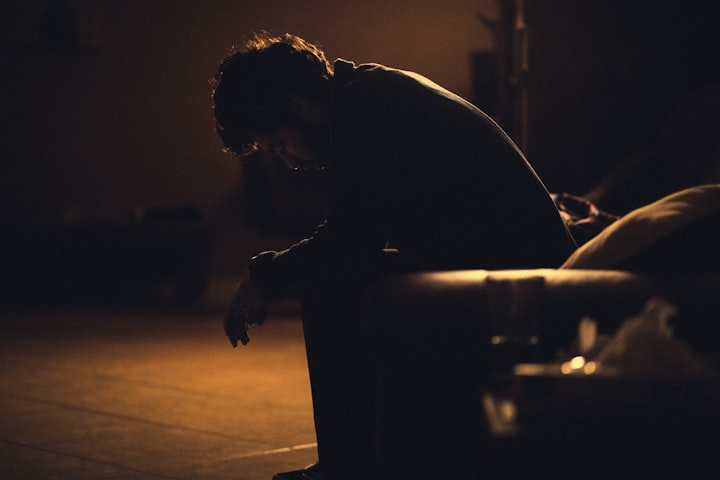Remembering Raymond
September is Suicide Awareness Month

September is Suicide Awareness Month, and today is the birthday of a dear one who lost his life to suicide. Below is my remembrance of him, written on the second birthday after his death; it's now been eight years since he left us and it's still unimaginable.
The United States recently unveiled and began operating its new suicide and and crisis hotline. It's simple...just 988. As a society we're beginning to take the issue more seriously, and this new number (a sort of 911 for mental illness) is a good step in the right direction. But there's much more we can still do...and much of that relies on things we can do on an individual basis. Talk about suicide; reach out to those in need; and practice kindness regularly (because you can't always tell who is in need).
~~~~~~~~~~~~
I didn't get a chance yesterday to bake a cake for Raymond's birthday.
Raymond was the closest I've ever had to a son. In fact, he would often affectionately call me his "Other Momma" while giving me one of his trademark bear hugs.
He was my oldest daughter's best friend, my middle daughter's biggest cheerleader and my youngest daughter's playmate. He was a regular at our sports gatherings (where he would often torment me for my love of the Dallas Cowboys), he came to our family Christmas dinners and we shared a love of our church.
Raymond was as much a part of my family as if I had given birth to him.
But I didn't get to bake him a birthday cake yesterday, because almost two years ago we lost him to suicide.
Losing him was inconceivable, and the moment of that loss is something that will never leave me. It haunts me still, as it does for his father and sister and brothers and dear friends.
In the days (now years) since Raymond's death, I've tried to understand it.
Tried to wrap my mind around it.
Prayed for some sense of clarification.
What I've learned is that understanding is near impossible, and yet we still need to make the attempt to understand--because there are too many lives at stake to ignore suicide, or sweep it under the rug, or to let it go.
And right now is the perfect time to talk about Raymond because September is National Suicide Prevention Awareness Month.
According to the American Foundation for Suicide Prevention, suicide is the 10th leading cause of death in the United States. One in five people are impacted directly by a suicide, and there are on average 117 suicides every day in the United States. Suicide happens in teenagers, young adults, middle agers and most often in the elderly.
During September, groups like the AFSP strive to teach us more about suicide and how we can prevent it from taking the lives of people like Raymond.
They teach us how to catch the warning signs of suicide, how to develop an action plan of prevention and where to go for more help.
Those organizations and groups can put it much succinctly than I ever could, but I'd still like to share what I think some of the steps toward prevention might be.
We must try and understand the cause.
There are a variety of reasons that suicide takes place; some of the most common causes are depression and other mental illnesses, health issues, substance abuse disorders and stressful life events.
When you looked at Raymond from the outside, you saw someone who liked to be the "life of the party." He was an Eagle Scout who loved to do things for others. But, on the inside, there was so much more going on--stress, self-medication, changes in job and social situations and feelings of hopelessness.
We also must get past the idea that "suicide happens to other people." It actually happens in your neighborhood, in your church, in your school, in your family. Suicide does not discriminate.
We must talk about it.
In preparation for this story, I talked to Raymond's father and asked if I could use his name. He had the perfect response to my request. He said that he wished I would use both his first and last name, "in case the message got to someone who knew Ray" and that "maybe it would touch home and make a difference."
We have to talk about suicide. It can't be something that is hush-hush, that we speak about only in whispers. It can't be a taboo topic.
The death of Robin Williams and other high-profile individuals to suicide has helped the conversation, but we need to do more to get the topic out in the open. The more we talk about it, the more people who are contemplating suicide may be able to talk about it.
We need to do things to prevent it.
After Raymond's death, many of us tried to reason that "there was nothing we could have done." But--and this still troubles me--is that really true? Couldn't we have noticed the signs and done something?
Experts tell us that there are ways to prevent suicide, both on an individual level and on a systemic level. We can learn about the warning signs, we can find help for mental disorders and we can know what to do if we find a person in trouble.
On a larger scale, we can make more people aware of these things. We can spread the word.
A family member who was close to Raymond texted me yesterday to tell me that she was making a cake for his birthday. She wanted to know what his favorite flavor was.
I reminded her that he loved confetti and red velvet and chocolate, and that any of those selections would be perfect. And I told her that it was beautiful that she was celebrating his life.
To remember Raymond, we may choose to sing "Happy Birthday," or cheer on his favorite sports team, or look at pictures of our moments together.
Even when it's really hard, we can keep his memory alive.
But there's more we must do.
We must keep the conversation going.
We must not be afraid of the word "suicide."
We must reach out to those who are hurting.
We must practice an awareness that we don't always recognize who is hurting.
We must provide resources to anyone who needs it.
In so doing, we may be able to save a life.
(If you’re in emotional distress or suicidal crisis, contact the 988 Suicide and Crisis Hotline by simply dialing 988. If you believe that someone else is in danger of suicide and you have their contact information, contact your local law enforcement for immediate help. You can also encourage them to dial 988 or chat at 988lifeline.org.
For more information, visit the Suicide Prevention Awareness Month website.)
About the Creator
Cheryl Wray
I'm a trained journalist who now dreams of writing fiction.
Enjoyed the story? Support the Creator.
Subscribe for free to receive all their stories in your feed. You could also pledge your support or give them a one-off tip, letting them know you appreciate their work.






Comments
There are no comments for this story
Be the first to respond and start the conversation.